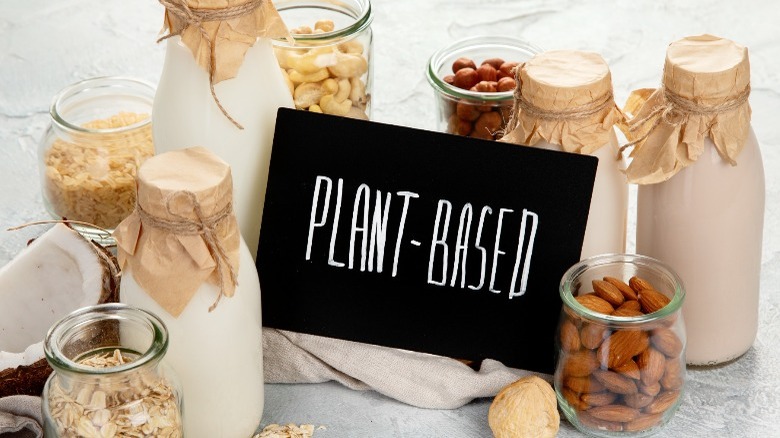What Liquids Should You Mix Protein Powder With?
If you're a vegetarian or someone who simply doesn't eat a lot of meat, eggs, or dairy, there's a good chance you may not be getting enough protein. Is getting enough protein really that important though? Absolutely! According to Healthline, protein is an essential macronutrient that supports growth and health maintenance, makes up 16% of your body weight, and is present in every cell in your body. Up to 35% of your diet needs to come from protein to maintain a healthy body (via Mayo Clinic).
The good news is that you have the option to include protein powder in your diet to make up for proteins that are lacking in your foods. And you have Irvin P. Johnson to thank for that. One of the earliest pioneers of protein powder, Johnson began to market a vitamin B1 complex and protein "miracle food" that he developed in his laboratory in the early 1950s, promising that the concoction could transform your physique (via University of Texas Stark Center).
Protein powder has evolved ever since, growing into a $5 billion-plus industry (via Statista). There is now a variety of types of protein powder that are plant-based or dairy-based and can help support weight management, add to muscle growth, and provide supplemental nutrition where it's lacking in your normal diet (via Medical News Today).
This is the best liquid to mix with your protein powder
The kind of liquid you choose to mix with your protein powder will depend on your goals. If you want to gain muscle, the experts at The Protein Works suggest that you mix milk with your protein powder because of the added protein and other nutrients within the milk. Go for skim milk if you are worried about high-fat content. Water may be the better option over milk if you are looking to lower your calorie intake, although you will miss out on the extra nutrients. Otherwise, the perfect compromise for you could be plant-based or dairy-free milk, such as almond milk or hazelnut milk. This is because these products will give your protein shake or smoothie the creamy texture of dairy milk while being a rich source of calcium and low in sugar and fat.
If you are considering adding protein powder to your diet, however, it is important to note that there can be some risks (via Harvard Health). For instance, look at labels to see if the protein powder contains high quantities of sugar. And if you are allergic to dairy, it's possible that certain protein powders may cause digestive issues. Also, a recent study found toxins in many protein powder products due to manufacturing processes. So, at the end of the day, it's best to consume protein powder drinks at a minimum and to get your main protein from natural foods such as nuts, seeds, legumes, and fish, per Harvard Health.


